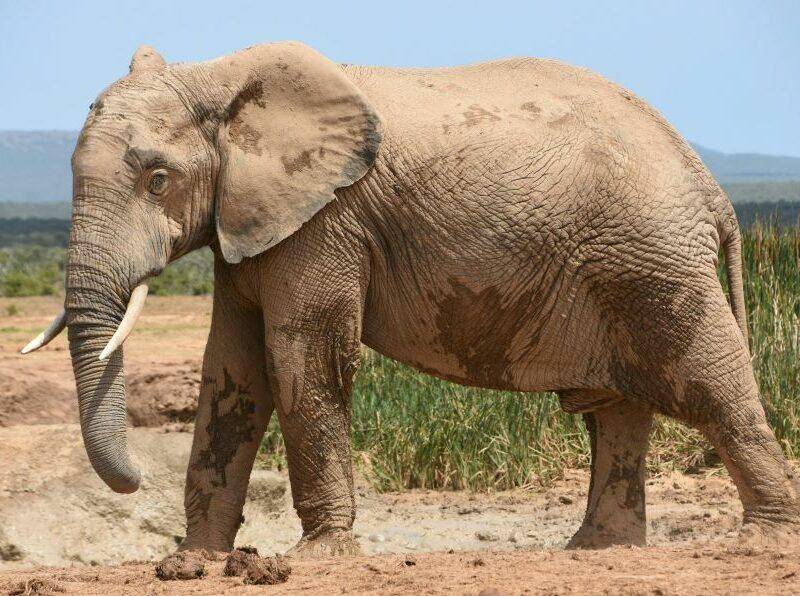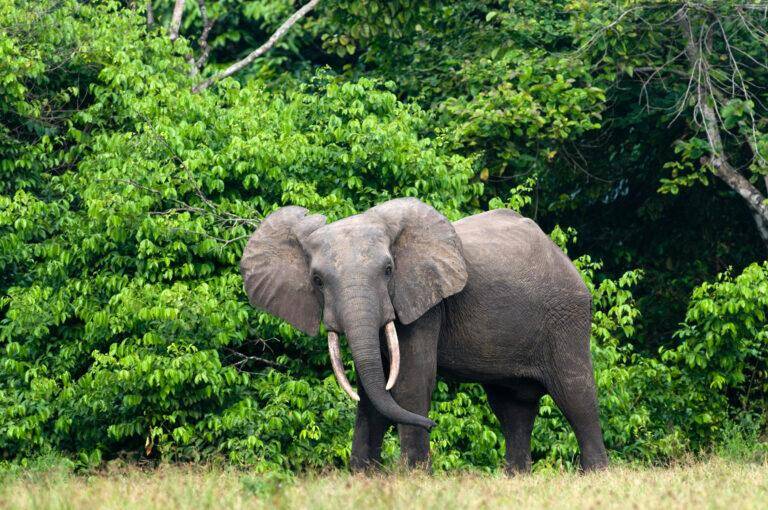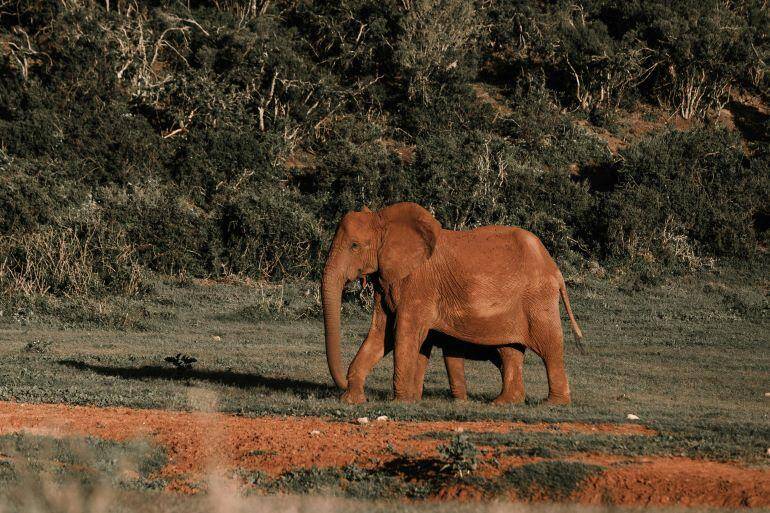When it comes to dangerous game hunting, Zimbabwe is seen as one of the best destinations worldwide to engage in some seriously action-packed hunting safaris. With four of Africa’s Big 5 being available on a Zimbabwean hunting safari, hunters are spoilt for choice. But one species remains a popular choice for game hunters in this African country, with the tuskless elephant being seen as even more challenging and aggressive to target than their tusked counterparts.
[DYNAMIC-BLOGTABLEOFCONTENT]
Key Takeaways
- Elephant hunting in Zimbabwe is a legal and sought-after dangerous game hunting safari.
- Hunting in Zimbabwe occurs throughout the year, but the best time to enjoy a hunting safari in the region is during the drier months from April to October.
- There are two types of elephants found in Africa, namely the African bush elephant and the African forest elephant.
- The greater majority of tuskless elephants are female. The gene for tusklessness in elephants is found in adaptations in the X chromosome, resulting in male embryos not developing and male tuskless elephants being extremely rare.
- Tuskless elephant hunts are seen as being more dangerous than hunting elephants with tusks, as they are generally cow elephants that are highly protective over their herd and more likely to react when unexpectedly surprised.
- The best areas to enjoy hunting tuskless elephants in Zimbabwe include the Matesti Deka Concession, the Campfire Communal Concessions throughout the country, as well as the Zambezi Valley.
- The main difference between tusked and tuskless elephant hunting regulations relates to export restrictions, as well as the purpose or objective of the hunt.
The Elephant At A Glance
Africa is home to two of the three species of elephants found worldwide and is the largest land mammal, with some species weighing more than 13,000 pounds.
The African Bush Elephant
This elephant, also known as the African savannah elephant, is native to sub-Saharan Africa, including countries such as South Africa, Kenya, Tanzania, Zambia, Zimbabwe, Uganda, and Angola. These mighty beasts can reach weights of up to 13,200 as adult males.

The African Forest Elephant
This elephant species is native to West Africa and the Congo Basin and is the smallest of the three elephant species, with adult males weighing in at around 6,600 pounds.

Elephants are known for their tough, gray, callous skin. Its large trunk is an extension of its upper lip and nose, and is used for a variety of tasks, including smelling, lifting, sensing, feeling, grasping, and breathing. An elephant’s trunk contains more than 100,000 muscles and tendons that are used to grasp, move and contract as needed. The most noticeable feature of most elephants is, of course, their tusks. These tusks, made from ivory, are actually incisors that extend beyond their mouths. Used in defense against predators, as well as in dominance fights with other elephants, tusks are also used to forage for food and dig for water.
Why Are Elephants Born Tuskless?
Tuskless elephants are born mainly due to genetic adaptations that have been driven by intense ivory poaching, with tusklessness being linked to the X chromosome. While this is mainly lethal for male elephants (and therefore very few male tuskless elephants are found), tuskless female elephants can survive and reproduce with less challenges and stress in environments where poaching is rampant.
While roughly 3-4% of an elephant population are born tuskless, tusklessness has become more prevalent in areas where those without tusks have a higher survival rate, for example in regions where poaching is more prevalent.
Tuskless Elephant Hunts: Unpredictable, Thrilling and Dangerous
Did you know that hunting tuskless elephants is often considered more dangerous than hunting an elephant with tusks? Sounds bizarre, but it is quite true.
Tuskless elephants are generally female, and these cows are highly protective over their herd, as well as any young calves and offspring. When they feel threatened, they are more likely to be aggressive and attack, to protect their family group.
Elephant cows are among the most common species to be shot in self-defense, due to their unpredictability when unexpectedly surprised. Feeling threatened, these elephants then attack the perceived danger, leading to humans shooting them in self-defense.
Elephant hunting in Zimbabwe can see the hunter unexpectantly coming face-to-face with an elephant while trying to stalk and track the herd through thick vegetation. This unexpected encounter comes with its own challenges, where a sudden attack by the startled elephant is a real consideration, and things can get very ugly very fast.
Where are the Best Location to Enjoy Hunting Elephants in Zimbabwe?
The best areas to enjoy tuskless elephant hunts in Zimbabwe are locations with high elephant populations, including amongst others:
Campfire Communal Concessions: These concessions are found throughout Zimbabwe and the community are involved in managing the local wildlife resources. The Campfire Communal Concessions provide hunters with the opportunity to harvest tuskless elephants as part of community-based conservation initiatives.
Zambezi Valley: The Zambezi Valley is renowned for its abundant elephant populations, and this includes tuskless elephants. A popular area for hunting tuskless elephants in this region is the Omay Concession.
Matetsi Deka Concession: This area is known for its abundant wildlife, including tuskless elephants.
How Do Hunting Regulations for Tuskless Elephants Differ from Those for Tusked Elephants?
The main difference comes in terms of export restrictions, as well as the purpose of the hunt. In terms of the purpose of the hunt, tusked elephants are usually hunted as trophies, while tuskless elephants are hunted mainly for population control and conservation strategies or initiatives.
When it comes to export restrictions, there are specific regulations that need to be adhered to with regards to the exportation of tusks, which therefore doesn’t apply to tuskless elephants.
Both tusked and tuskless elephants are subject to permits and quotas.
While both tusked and tuskless elephant hunting safaris contribute to local communities through financial support and employment opportunities for locals, tuskless elephant hunts, while not as desirable in terms of the lack of tusks, do make a major contribution through the disbursement of meat to local and underprivileged communities.
Elephant Hunting and the Role it Plays in Local Communities
Elephant hunting plays a big role in sustaining local communities and these communities are largely dependent on elephant and other hunts for survival.
- Local community members are employed as trackers, skinners, guides, cooks, cleaners, and so forth to assist in the game hunting industry.
- Meat from the game hunting safaris are distributed to needy communities, ensuring a great source of protein for hungry villagers. In Africa, many communities are impoverished, and meat is a luxury that few can afford.
- Funds from tags and licenses are utilised to fund conservation initiatives and other programs, such as the building of local clinics, schools and infrastructure, across the country.
Frequently Asked Questions
Is hunting in Zimbabwe legal?
Yes, hunting in Zimbabwe is legal, with many species of game available to hunt. From dangerous game, such as Cape buffalo, elephant, and lion, to an array of African plains game and specialty animals, Zimbabwe hunting safaris leave a hunter spoilt for choice.
Can you hunt elephants in Zimbabwe?
Elephant hunting in Zimbabwe is not only legal, but this dangerous game species is a sought-after trophy for many hunters worldwide.
Can you hunt the Big 5 in Zimbabwe?
Four of Africa’s Big 5 can be hunted in Zimbabwe. The elephant, lion, leopard and Cape buffalo are available to hunt, with the remaining Big 5 member, the rhino, not being available to be targeted when hunting in Zimbabwe. The rhino can only be hunted in Namibia and South Africa.
How many wild elephants are there in Zimbabwe?
Zimbabwe is said to have the second largest wild elephant population in the world, after its neighbor Botswana. It is estimated that there are more than 80,000 elephants roaming in Zimbabwe.
When is the best time to go hunting in Zimbabwe?
Hunting in Zimbabwe is available all year-round, but prime hunting season is during the drier months of around April / May to October.
When is the best time to go elephant hunting in Zimbabwe?
The best time to go elephant hunting in Zimbabwe is annually from April to August.
Is it safe to hunt in Zimbabwe?
Zimbabwe remains a quite safe country in which to hunt, with local outfitters collecting their clients at the airport and then heading out to the hunting safari grounds. As with any country worldwide, basic safety protocols should be followed, including not leaving luggage unattended, not flashing large wads of money around, etc.
Can I use a bow for elephant hunting in Zimbabwe?
Yes, a bow may be used, but a special permit is required. Speak to your African outfitter for further information and assistance. The permit is issued by the Zimbabwe Parks and Wildlife Management Authority (ZPWMA) and should be applied for well in advance of the African hunt.
What Caliber Is Required for Elephant Hunting in Zimbabwe?
Dangerous game hunting requires a minimum of a .375 caliber with a 300-grain bullet, with solid bullets to be used as this member of African’s Big 5 has an extremely thick skull and vertebrae. Calibers 450 grain and up, such as a .416 Rigby, .458, or .458 Lott are highly recommended when hunting elephants.
Where are the Best Locations for Elephant Hunting in Zimbabwe?
Zimbabwe is home to more than 80,000 elephants, with 50,000 of these magnificent animals found in Hwange (Matetsi region) and the Zambezi Valley. These areas are renowned for their array of abundant wildlife species.
Are Elephants Dangerous?
While elephants are often referred to as “gentle giants,” they can and will attack and protect themselves and their herd. This member of Africa’s Big 5 and Dangerous 7 not only has a hefty weight advantage on its side but uses its tusks for both protection and attack.
Tuskless Elephant Hunting in Zimbabwe: A Dream African Hunting Safari
Hunting in Africa is not for the faint-hearted, especially when you are enjoying a dangerous game hunting safari in Zimbabwe! The thrill of an adrenaline-filled elephant hunt is exceptional, with danger lurking around every bush. These magnificent animals are not to be messed with, and while docile, will not hesitate to defend themselves. Do you have what it takes to enjoy elephant hunting in Zimbabwe? Check out our latest Zimbabwean elephant hunting adventures here.
